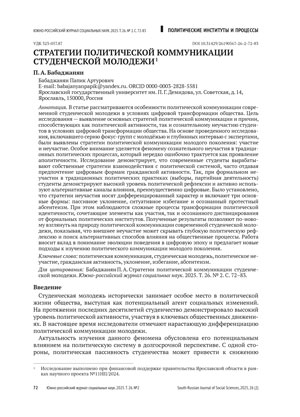Аннотация
В статье рассматриваются особенности политической коммуникации современной студенческой молодежи в условиях цифровой трансформации общества. Цель исследования — выявление основных стратегий политической коммуникации и причин, способствующих как политической активности, так и сознательному неучастию студентов в условиях цифровой трансформации общества. На основе проведенного исследования, включавшего серию фокус-групп с молодёжью и глубинных интервью с экспертами, были выявлены стратегии политической коммуникации молодого поколения: участие и неучастие. Особое внимание уделяется феномену сознательного неучастия в традиционных политических процессах, который нередко ошибочно трактуется как проявление аполитичности. Исследование демонстрирует, что современные студенты вырабатывают собственные стратегии взаимодействия с политической системой, часто отдавая предпочтение цифровым формам гражданской активности. Так, при формальном неучастии в традиционных политических практиках (выборы, партийная деятельность) студенты демонстрируют высокий уровень политической рефлексии и активно используют альтернативные каналы влияния, преимущественно цифровые. Было установлено, что стратегии неучастия носят дифференцированный характер и включают три основные формы: пассивное уклонение, ситуативное избегание и осознанный протестный абсентеизм. При этом наблюдаются сложные процессы трансформации политической идентичности, сочетающие элементы как участия, так и осознанного дистанцирования от формальных политических институтов. Полученные результаты позволяют по-новому взглянуть на природу политической коммуникации современной студенческой молодежи, показывая, что внешнее неучастие может скрывать глубокую политическую рефлексию и поиск альтернативных способов влияния на общественные процессы. Работа вносит вклад в понимание эволюции поведения в цифровую эпоху и предлагает новые подходы к изучению политического коммуникации молодого поколения.
Ключевые слова
Информация о финансировании
Исследование выполнено при финансовой поддержке правительства Ярославской области в рамках научного проекта №11НП/2024.
Библиографические ссылки
Васильева, О.Б., Погодина, О.А. (2022). Процесс политической социализации как механизм формирования поддержки политической системы. Педагогическое образование и наука, 2, 7–12. DOI: 10.56163/2072-2524-2022-2-7-12
Еремина, И.С. (2012). Сущность проявления феномена гражданственности в структуре личности. Современные исследования социальных проблем (электронный научный журнал), 9. 61.
Зинуров, Э.А. (2023). Ценностно-рациональное поведение студенческой молодежи как отражение социокультурной ситуации в обществе. Управление устойчивым развитием, 5(48), 54–61. DOI: 10.55421/2499992X_2023_5_54
Зубок Ю.А. (2020). Молодежь: жизненные стратегии в новой реальности. Мониторинг общественного мнения: экономические и социальные перемены, 3, 4–12.
Карлаков, В.С. (2019). Политические институты в контексте институционального и неоинституционального подходов. Modern Science, 5–3, 152–156.
Косач, Г.Е. (2021). Рационализация выбора молодежью стратегий занятости в условиях изменяющегося общества. Государственное и муниципальное управление. Ученые записки, 4, 275–279. DOI: 10.22394/2079-1690-2021-1-4-275-279
Мелихов, Г.В. (2017). Неучастие как социально-значимое действие. Вестник Самарской гуманитарной академии. Серия: Философия. Филология, 1(21), 43–53.
Миронова, Т.А. (2017). Основные направления политической коммуникации студенческой молодежи. Этносоциум и межнациональная культура, 12(114), 104–111.
Николаев, М.В. (2020). Некоторые аспекты формирования гражданственности обучающихся в цифровом обществе. Вестник Сургутского государственного педагогического университета, 4(67), 126–132 DOI: 10.26105/SSPU.2020.40.79.013
Парфенова, Ю.В. (2016). Новые формы политического участия в условиях общества, основанного на знании. Вестник Санкт-Петербургского университета. Серия 6. Политология. Международные отношения, 2, 63–71. DOI: 10.21638/11701/spbu06.2016.20663
Пустовойт, Ю.А., Пель В.С., Коба С.М. (2022). Теории поколений о факторах социально-политической динамики. Реконструкция теоретического поля. Локус: люди, общество, культуры, смыслы, 13(2), 144–158, DOI: 10.31862/2500-2988-2022-13-2-144-158
Пустошинская, О.С. (2023). Множественная гражданственность как производная постсовременности. PolitBook, 1, 87–106.
Расторгуев, С.В. (2023). Политическая идентичность и политическая культура современной российской молодежи. Власть, 31(4), 126–131. DOI: 10.31171/vlast.v31i4.9702
Соколов, А.В., Миронова, С.В. (2023). Специфика онлайн-коммуникации студентов с вузом в социальных сетях и мессенджерах. Социальные и гуманитарные знания, 9(2), 152–175. DOI: 10.18255/2412-6519-2023-2-152-175
Соколов, А.В. Фролов А.А., Бабаджанян П.А. (2024). Уклонение студенческой молодежи от общественно-политической активности: причины, формы и способы вовлечения. Вестник Российского университета дружбы народов. Серия: Политология, 26(2), 389–405. DOI: 10.22363/2313-1438-2024-26-2-389-405
Abdulla, S.M. (2022). The concepts of deictic shift theory and discourse theory of silencing. Education Quarterly Reviews, 5(1). DOI: 10.31014/aior.1993.05.01.441
Drury, J. (2020). Recent Developments in the Psychology of Crowds and Collective Behaviour. Current Opinion in Psychology, 35, 12–16. DOI: 10.1016/j.copsyc.2020.02.005
Inglehart, R.F., Baker, W. (2000). Modernization, Cultural Change and the Persistence of Traditional Values. American Sociological Review, 65(1), 19–51. DOI: 10.2307/2657288
Özdemir, S.B., Stattin, H, Özdemir, M. (2016). Youth’s Initiations of Civic and Political Discussions in Class: Do Youth’s Perceptions of Teachers’ Behaviors Matter and Why? Journal of Youth and Adolescence, 45(11), 2233–2245. DOI: 10.1007/s10964-016-0525‑z


